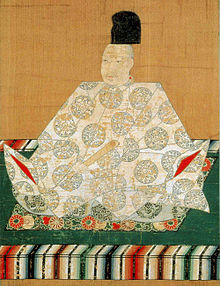Emperor Ogimachi
| Ōgimachi | |
|---|---|
| Emperor of Japan | |

Ōgimachi
|
|
| Reign | 1557–1586 |
| Predecessor | Go-Nara |
| Successor | Go-Yōzei |
| Born | June 18, 1517 |
| Died | February 6, 1593 (aged 75) |
| Burial | Fukakusa no kita no Misasagi (Kyoto) |
Emperor Ōgimachi (正親町天皇 Ōgimachi-tennō) (June 18, 1517 – February 6, 1593) was the 106th Emperor of Japan, according to the traditional order of succession. He reigned from October 27, 1557, to December 17, 1586, corresponding to the transition between the Warring States Era and the Azuchi–Momoyama period. His personal name was Michihito (方仁).
Ōgimachi was the first son of Emperor Go-Nara
Ōgimachi became Emperor upon the death of Emperor Go-Nara.
The finances of the emperor and his court were greatly strained. The authority of the Imperial Court also began to fall, but this trend reversed after Oda Nobunaga entered Kyoto in a show of allegiance but which also indicated that the Emperor had the Oda clan's support. Frequently using the Emperor as a mediator when fighting enemies, Nobunaga worked to unify the disparate elements to Japan. However, by around 1573, Nobunaga began demanding the Emperor's abdication, but the Emperor refused.
Before political power was transferred to Toyotomi Hideyoshi, in order to take advantage of Ōgimachi's authority, the power of the Imperial Family was increased. In this way, Hideyoshi and the Imperial Family entered into a mutually beneficial relationship.
In 1586, Emperor Ōgimachi abdicated in favor of his grandson, Imperial Prince Katahito (周仁親王), who became the Emperor Go-Yōzei. Ōgimachi retired to the Sennōda Palace. On February 6, 1593, he died.
During Ōgimachi's reign, with the assistance of Oda Nobunaga and Toyotomi Hideyoshi, the imperial family was able to halt the political, financial, and cultural decline it had been in since the Ōnin War, and began a time of recovery.
Ōgimachi is enshrined with other emperors at the imperial tomb called Fukakusa no kita no misasagi (深草北陵) in Fushimi-ku, Kyoto.
...
Wikipedia
